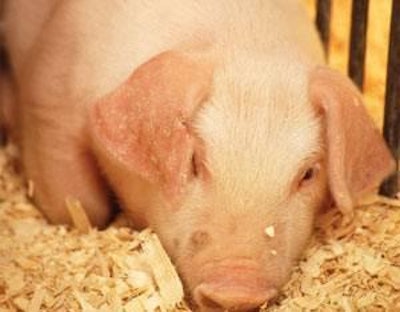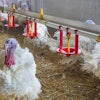
Over the last two decades, oral administration of nucleotides has been a focus of interest in paediatric nutrition. Nucleotides have been proven to have an effect on the immune system, growth and development of the small intestine, lipid metabolism and liver function (Table 1).
Because nucleotides can be synthesised by the organism, they are not considered essential nutrients. However, in periods of stress, rapid growth or limited nutritional supply, endogenous synthesis could prove insufficient to cover the body's needs, and so they are considered "semi" or "conditionally" essential nutrients.
Stress of early weaning
In today's pig production, there is a stage when handling stress, limited supply of nutrition and rapid growth of some tissues, especially the intestinal mucosa, all coincide and this is during early weaning. This stage is characterised by insufficient feed intake to cover the needs of the piglet, not only of nucleotides, but also of energy and glutamine which are the precursors of the endogenous synthesis of nucleotides. This is why it is reasonable to expect that the oral supplementation of recently weaned piglets with nucleotides would have a growth and/or health-promoting effect, as has been shown in nursing infants.
The first step for developing a nucleotide supplement for piglets is to quantify the need for these nutrients. To do this, it is necessary to determine the nucleotide content of sow milk during lactation and the contribution of nucleotides to the starter diet (Figure 1 and Table 2). The analytical results described by Mateo et al. (2004) were confirmed by a later study (Martinez-Puig et al., 2007) which also showed that piglets need a specific profile of available nucleotides. By comparing the nucleotide content in the ingredients used in weaning diets with the content of sow milk, it is possible to estimate the nucleotide deficiency in the feed offered to piglets at the time of weaning (Table 3).
Nucleotide deficiency
The results show the deficiency of nucleotides presented by the prestarter diet. Using this information, a diet can be formulated to meet requirements for nucleotides during this period. For example, these results were used to design a product (Nucleoforce Piglets, BIOIBERICA, S.A.) which, when incorporated in the prestarter feed at 1,000 ppm, provides the same quantity of nucleotides as sow milk.
Martinez-Puig et al. (2007) designed a study to determine the effect of a nucleotide supplement on the development of intestinal mucosa using 24 piglets of 21 days of age from six litters. The piglets were randomly distributed in four groups: one group of six piglets remained in lactation, whereas the other three groups were weaned. Of the weaned groups, one was fed with a commercial prestarter diet (control group), another was fed the same diet supplemented with the same amount of nucleotides as the milk (1,000 ppm) and the last with double the nucleotides (2,000 ppm). Seven days after weaning, the piglets were sacrificed and samples were taken of distal jejunum (2 m from the ileocecal union). These were fixed in formol and processed to study the morphology of the intestinal mucosa.
Effect on performance
As shown in Figure 2, the transition from milk to a solid diet causes a reduction in the length of the intestinal villosities of 39 percent at 7 days after weaning. The nucleotide supplement brought about a significant reduction (P<0.001) in the atrophy of the villosities which is characteristic of weaning.
A later study was then performed under field conditions to determine the impact of the nucleotide supplement on productive performance (Martinez-Puig et al., 2007). A total of 384 piglets weaned at 21 days of age were divided into three groups and fed with three experimental diets for a period of two weeks. One group was fed with a commercial diet (control group), another with the same diet supplemented with 750 ppm of nucleotides and a third with the same diet supplemented with 1,000 ppm of nucleotides. Feed consumption, growth, incidence of diarrhoea and mortality were monitored on a weekly basis. During the trial, there was a bout of diarrhoea, associated with a beta-haemolytic strain of E coli, which negatively affected the general productive performance of all the animals (Table 4). However there was a significant reduction (P<0.001) in the incidence of diarrhoea in the animals supplemented with 750 ppm (3.13 percent) and 1,000 ppm of nucleotides (1.53 percent) compared to the control group (15.6 percent), as well as a numeric reduction in the mortality rate. These results suggest that the administration of nucleotides could aid in preventing the appearance of diarrhoea in piglets, as already previously demonstrated in children (Yu et al. 1998).
Finally another test was performed to study the impact of nucleotide supplements on recently weaned piglets under correct health conditions. A total of 192 nursing piglets of 14 days of age were used. They were divided into two groups, one fed with a control milk starter and the other with the same milk starter supplemented with 1,000 ppm of nucleotides. The piglets were weaned at 21 days and consumed the experimental diets until day 35. From day 35 to 56 all the piglets were fed with a standard commercial diet. Apart from monitoring the appearance of diarrhoea and mortality, records were made of productive performance on days 21, 28, 35 and 56. Results are shown in Table 5. During the prestarter stage (21 to 35 days) the piglets supplemented with nucleotides presented greater growth (75.3 g/D) than the control group (52.0 g/D), although the differences were not statistically significant (P=0.12). During the starter stage (35-56 D), improvements were observed in the group supplemented with nucleotides compared to the control group, both in growth (increase of 20 percent; P<0.05) and the conversion ratio (reduction of 24 percent; P=0.14).
Results of the last study demonstrate that the improvement in the development of the intestinal mucosa promoted by the dietary supplement of nucleotides affects the productive performance of the animals.





.jpg?auto=format%2Ccompress&fit=crop&h=167&q=70&w=250)











